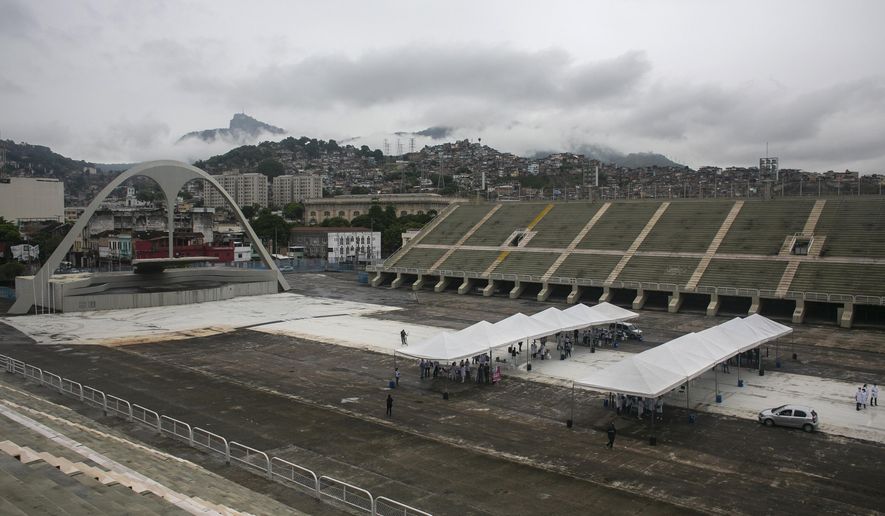RIO DE JANEIRO (AP) - In a normal year, Rio de Janeiro’s Sambadrome would be preparing for its great moment of the year: the world’s most famous Carnival parade.
But a week before what should be the start of Carnival, the pandemic has replaced pageantry, with the great celebration put on hold until next year as Rio struggles to quash a rise in COVID-19 cases.
The Rio mayor’s office opened a drive-thru immunization station Saturday at the Sambadrome, where a line of cars queued up on a broad avenue built for floats.
“This is usually a place of pleasure. Today it is too, because we are exercising an act of citizenship and we are opening the Sambadrome to vaccinate, ” said Paulo Roberto Machado, a 68-year-old nurse who teaches at the Veiga de Almeida University.
Machado has taken part in 40 years of Carnival parades here, but on Saturday he was coordinating 20 volunteer nursing and medical students vaccinating people over 90 years old.
“The vaccine represents the hope of better days, of returning to normality, to what we did before,” Machado said.
Rio’s city government officially suspended Carnival and warns it will have no tolerance for those who try to celebrate with open street parades or clandestine parties, saying it is monitoring social media to detect any.
Paes, who often participates in the parade at the Sambadrome, asked citizens not to be “idiots” by ignoring the rules and buying tickets to parties that will not be allowed. “It’s a cat-and-mouse game looking to punish those who want party”, the mayor said.
The cancellation has created a deep economic hole for many businesses that depend on the crowds.
Rio’s hotel occupancy rate normally reaches about 80% in the hot summer months and 100% during Carnival. It’s now at roughly 50-60%, according to Alfredo Lopes, the president of Rio’s Hospitality Workers Union.
Thousands of Cariocas, as the city’s residents are called, also have been idled at the samba schools where they build floats and sew costumes for the vast crowds.
The pandemic has hit hard in Rio, where the authorities have counted more than 17,600 deaths from COVID-19 – the most of any city in Brazil, topping even Sao Paulo, which has nearly twice its population.
Margareth Dalcomo, a professor of respiratory medicine at the state-funded Oswaldo Cruz Foundation in Rio, said that the city is paying the consequences for a lack of municipal management in health in recent years.
“Rio had a political and administrative problem that had an impact on poor quality medical care, and it is also poorer than Sao Paulo,” Dalcomo told The Associated Press, noting that many residents live in Rio’s more than 700 slums, known as favelas.
- AP Videojournalists Mario Lobão and Diarlei Rodrigues contributed to this report.




Please read our comment policy before commenting.